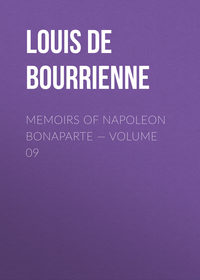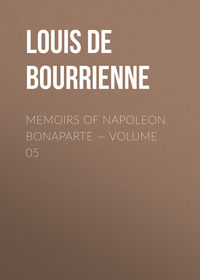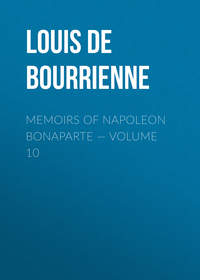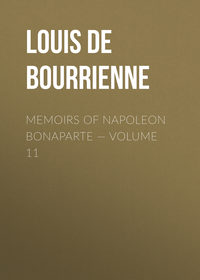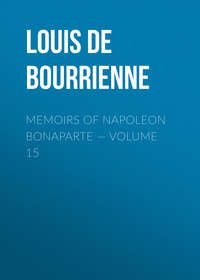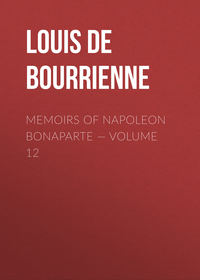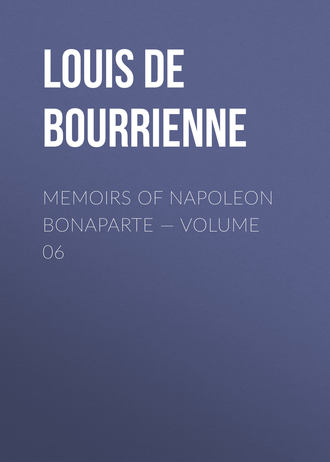 полная версия
полная версияMemoirs of Napoleon Bonaparte — Volume 06
The event in question occurred in the spring of 1802. It was at this period that Bonaparte first occupied St. Cloud, which he was much pleased with, because he found himself more at liberty there than at the Tuileries; which palace is really only a prison for royalty, as there a sovereign cannot even take the air at a window without immediately being the object of the curiosity of the public, who collect in large crowds. At St. Cloud, on the contrary, Bonaparte could walk out from his cabinet and prolong his promenade without being annoyed by petitioners. One of his first steps was to repair the cross road leading from St. Cloud to Malmaison, between which places Bonaparte rode in a quarter of an hour. This proximity to the country, which he liked, made staying at St. Cloud yet pleasanter to him. It was at St. Cloud that the First Consul made, if I may so express it, his first rehearsals of the grand drama of the Empire. It was there he began to introduce, in external forms, the habits and etiquette which brought to mind the ceremonies of sovereignty. He soon perceived the influence which pomp of ceremony, brilliancy of appearance, and richness of costume, exercise over the mass of mankind. "Men," he remarked to me a this period, "well deserve the contempt I feel for them. I have only to put some gold lace on the coats of my virtuous republicans and they immediately become just what I wish them."
I remember one day, after one of his frequent sallies of contempt for human kind, I observed to him that although baubles might excite vulgar admiration, there were some distinguished men who did not permit themselves to be fascinated by their allurements; and I mentioned the celebrated Fox by way of example, who, previous to the conclusion of the peace of Amiens, visited Paris, where he was remarked for his extreme simplicity. The First Consul said, "Ah! you are right with respect to him. Mr. Fox is a truly great man, and pleases me much."
In fact, Bonaparte always received Mr. Fox's visits with the greatest satisfaction; and after every conversation they had together he never failed to express to me the pleasure which he experienced in discoursing with a man every way worthy of the great celebrity he had attained. He considered him a very superior man, and wished he might have to treat with him in his future negotiations with England. It may be supposed that Mr. Fox, on his part, never forgot the terms of intimacy, I may say of confidence, on which he had been with the First Consul. In fact, he on several occasions informed him in time of war of the plots formed against his life. Less could not be expected from a man of so noble a character. I can likewise affirm, having more than once been in possession of proofs of the fact, that the English Government constantly rejected with indignation all such projects. I do not mean those which had for their object the overthrow of the Consular or Imperial Government, but all plans of assassination and secret attacks on the person of Bonaparte, whether First Consul or Emperor. I will here request the indulgence of the reader whilst I relate a circumstance which occurred a year before Mr. Fox's journey to Paris; but as it refers to Moreau, I believe that the transposition will be pardoned more easily than the omission.
During the summer 1801 the First Consul took a fancy to give a grand military dinner at a restaurateur's. The restaurateur he favoured with his company was Veri, whose establishment was situated on the terrace of the Feuillans with an entrance into the garden of the Tuileries. Bonaparte did not send an invitation to Moreau, whom I met by chance that day in the following manner:—The ceremony of the dinner at Veri's leaving me at liberty to dispose of my time, I availed myself of it to go and dine at a restaurateur's named Rose, who then enjoyed great celebrity amongst the distinguished gastronomes. I dined in company with M. Carbonnet, a friend of Moreau's family, and two or three other persons. Whilst we were at table in the rotunda we were informed by the waiter who attended on us that General Moreau and his wife, with Lacuee and two other military men, were in an adjoining apartment. Suchet, who had dined at Veri's, where he said everything was prodigiously dull, on rising from the table joined Moreau's party. These details we learned from M. Carbonnet, who left us for a few moments to see the General and Madame Moreau.
Bonaparte's affectation in not inviting Moreau at the moment when the latter had returned a conqueror from the army of the Rhine, and at the same time the affectation of Moreau in going publicly the same day to dine at another restaurateur's, afforded ground for the supposition that the coolness which existed between them would soon be converted into enmity. The people of Paris naturally thought that the conqueror of Marengo might, without any degradation, have given the conqueror of Hohenlinden a seat at his table.
By the commencement of the year 1802 the Republic had ceased to be anything else than a fiction, or an historical recollection. All that remained of it was a deceptive inscription on the gates of the Palace. Even at the time of his installation at the Tuileries, Bonaparte had caused the two trees of liberty which were planted in the court to be cut down; thus removing the outward emblems before he destroyed the reality. But the moment the Senatorial decisions of the 2d and 4th of August were published it was evident to the dullest perceptions that the power of the First Consul wanted nothing but a name.
After these 'Consultes' Bonaparte readily accustomed himself to regard the principal authorities of the State merely as necessary instruments for the exercise of his power. Interested advisers then crowded round him. It was seriously proposed that he should restore the ancient titles, as being more in harmony with the new power which the people had confided to him than the republican forms. He was still of opinion, however, according to his phrase, that "the pear was not yet ripe," and would not hear this project spoken of for a moment. "All this," he said to me one day, "will come in good time; but you must see, Bourrienne, that it is necessary I should, in the first place, assume a title, from which the others that I will give to everybody will naturally take their origin. The greatest difficulty is surmounted. There is no longer any person to deceive. Everybody sees as clear as day that it is only one step which separates the throne from the Consulate for life. However, we must be cautious. There are some troublesome fellows in the Tribunate, but I will take care of them."
Whilst these serious questions agitated men's minds the greater part of the residents at Malmaison took a trip to Plombieres. Josephine, Bonaparte's mother, Madame Beauharnais-Lavallette, Hortense, and General Rapp, were of this party. It pleased the fancy of the jocund company to address to me a bulletin of the pleasant and unpleasant occurrences of the journey. I insert this letter merely as a proof of the intimacy which existed between the writers and myself. It follows, precisely as I have preserved it, with the exception of the blots, for which it will be seen they apologised.
AN ACCOUNT OF THE JOURNEY TO PLOMBIERES.
To the Inhabitants of Malmaison.
The whole party left Malmaison in tears, which brought on such dreadful headaches that all the amiable persons were quite overcome by the idea of the journey. Madame Bonaparte, mere, supported the fatigues of this memorable day with the greatest courage; but Madame Bonaparte, Consulesse, did not show any. The two young ladies who sat in the dormouse, Mademoiselle Hortense and Madame Lavallette, were rival candidates for a bottle of Eau de Cologne; and every now and then the amiable M. Rapp made the carriage stop for the comfort of his poor little sick heart, which overflowed with bile: in fine, he was obliged to take to bed on arriving at Epernay, while the rest of the amiable party tried to drown their sorrows in champagne. The second day was more fortunate on the score of health and spirits, but provisions were wanting, and great were the sufferings of the stomach. The travellers lived on the hope of a good supper at Toul; but despair was at its height when, on arriving there, they found only a wretched inn, and nothing in it. We saw some odd-looking folks there, which indemnified us a little for spinach dressed in lamp-oil, and red asparagus fried with curdled milk. Who would not have been amused to see the Malmaison gourmands seated at a table so shockingly served!
In no record of history is there to be found a day passed in distress so dreadful as that on which we arrived at Plombieres. On departing from Toul we intended to breakfast at Nancy, for every stomach had been empty for two days; but the civil and military authorities came out to meet us, and prevented us from executing our plan. We continued our route, wasting away, so that you might, see us growing thinner every moment. To complete our misfortune, the dormouse, which seemed to have taken a fancy to embark on the Moselle for Metz, barely escaped an overturn. But at Plombieres we have been well compensated for this unlucky journey, for on our arrival we were received with all kinds of rejoicings. The town was illuminated, the cannon fired, and the faces of handsome women at all the windows give us reason to hope that we shall bear our absence from Malmaison with the less regret.
With the exception of some anecdotes, which we reserve for chit-chat on our return, you have here a correct account of our journey, which we, the undersigned, hereby certify.
JOSEPHINE BONAPARTE.
BEAUHARNAIS-LAPALLETTE.
HORTENSE BEAUHARNAIS.
RAPP.
BONAPARTE, mere.
The company ask pardon for the blots.
21st Messidor.
It is requested that the person who receives this journal will show it to all who take an interest in the fair travellers.
This journey to Plombieres was preceded by a scene which I should abstain from describing if I had not undertaken to relate the truth respecting the family of the First Consul. Two or three days before her departure Madame Bonaparte sent for me. I obeyed the summons, and found her in tears. "What a man-what a man is that Lucien!" she exclaimed in accents of grief. "If you knew, my friend, the shameful proposals he has dared to make to me! 'You are going to the waters,' said he; 'you must get a child by some other person since you cannot have one by him.' Imagine the indignation with which I received such advice. 'Well,' he continued, 'if you do not wish it, or cannot help it, Bonaparte must get a child by another woman, and you must adopt it, for it is necessary to secure an hereditary successor. It is for your interest; you must know that.'— 'What, sir!' I replied, 'do you imagine the nation will suffer a bastard to govern it? Lucien! Lucien! you would ruin your brother! This is dreadful! Wretched should I be, were any one to suppose me capable of listening, without horror, to your infamous proposal! Your ideas are poisonous; your language horrible!'—'Well, Madame,' retorted he, 'all I can say to that is, that I am really sorry for you!'"
The amiable Josephine was sobbing whilst she described this scene to me, and I was not insensible to the indignation which she felt. The truth is, that at that period Lucien, though constantly affecting to despise power for himself, was incessantly labouring to concentrate it in the hands of his brother; and he considered three things necessary to the success of his views, namely, hereditary succession, divorce, and the Imperial Government.
Lucien had a delightful house near Neuilly. Some days before the deplorable scene which I have related he invited Bonaparte and all the inmates at Malmaison to witness a theatrical representation. 'Alzire' was the piece performed. Elise played Alzire, and Lucien, Zamore. The warmth of their declarations, the energetic expression of their gestures, the too faithful nudity of costume, disgusted most of the spectators, and Bonaparte more than any other. When the play was over he was quite indignant. "It is a scandal," he said to me in an angry tone; "I ought not to suffer such indecencies—I will give Lucien to understand that I will have no more of it." When his brother had resumed his own dress, and came into the salon, he addressed him publicly, and gave him to understand that he must for the future desist from such representations. When we returned to Malmaison; he again spoke of what had passed with dissatisfaction. "What!" said he, "when I am endeavouring to restore purity of manners, my brother and sister must needs exhibit themselves upon the boards almost in a state of nudity! It is an insult!"
Lucien had a strong predilection for theatrical exhibitions, to which he attached great importance. The fact is, he declaimed in a superior style, and might have competed with the best professional actors. It was said that the turban of Orosmane, the costume of America, the Roman toga, or the robe of the high priest of Jerusalem, all became him equally well; and I believe that this was the exact truth. Theatrical representations were not confined to Neuilly. We had our theatre and our company of actors at Malmaison; but there everything was conducted with the greatest decorum; and now that I have got behind the scenes, I will not quit them until I have let the reader into the secrets of our drama.
By the direction of the First Consul a very pretty little theatre was built at Malmaison. Our usual actors were Eugene BEAUHARNAIS, Hortense, Madame Murat, Lauriston, M. Didelot, one of the prefects of the Palace, some other individuals belonging to the First Consul's household, and myself. Freed from the cares of government, which we confined as much as possible to the Tuileries, we were a very happy colony at Malmaison; and, besides, we were young, and what is there to which youth does not add charms? The pieces which the First Consul most liked to see us perform were, 'Le Barbier de Seville' and 'Defiance et Malice'. In Le Barbier Lauriston played the part of Count Almaviva; Hortense, Rosins; Eugene, Basil; Didelot, Figaro; I, Bartholo; and Isabey, l'Aveille. Our other stock pieces were, Projets de Mariage, La Gageltre, the Dapit Anloureux, in which I played the part of the valet; and L'Impromptu de Campagne, in which I enacted the Baron, having for my Baroness the young and handsome Caroline Murat.
Hortense's acting was perfection, Caroline was middling, Eugene played very well, Lauriston was rather heavy, Didelot passable, and I may venture to assert, without vanity, that I was not quite the worst of the company. If we were not good actors it was not for want of good instruction and good advice. Talma and Michot came to direct us, and made us rehearse before them, sometimes altogether and sometimes separately. How many lessons have I received from Michot whilst walking in the beautiful park of Malmaison! And may I be excused for saying, that I now experience pleasure in looking back upon these trifles, which are matters of importance when one is young, and which contrasted so singularly with the great theatre on which we did not represent fictitious characters? We had, to adopt theatrical language, a good supply of property. Bonaparte presented each of us with a collection of dramas very well bound; and, as the patron of the company, he provided us with rich and elegant dresses.
—[While Bourrienne, belonging to the Malmaison company, considered that the acting at Neuilly was indecent, Lucien, who refused to act at Malmaison, naturally thought the Malmaison troupe was dull. "Hortense and Caroline filled the principal parts. They were very commonplace. In this they followed the unfortunate Marie Antoinette and her companions. Louis XVI., not naturally polite, when seeing them act, had said that it was royally badly acted" (see Madame Campan's Life of Marie Antoinette, tome i. p. 299). "The First Consul said of his troupe that it was sovereignly badly acted". . . Murat, Lannes, and even Caroline ranted. Elisa, who, having been educated at Saint Cyr, spoke purely and without accent, refused to act. Janot acted well the drunken parts, and even the others he undertook. The rest were decidedly bad. Worse than bad— ridiculous" (Iung's Lucien's, tome ii. p. 256). Rival actors are not fair critics. Let us hear Madame Junot (tome ii. p. 103). "The cleverest of our company was M. de Bourrienne. He played the more dignified characters in real perfection, and his talent was the more pleasing as it was not the result of study, but of a perfect comprehension of his part." And she goes on to say that even the best professional actors might have learnt from him in some parts. The audience was not a pleasant one to face. It was the First Consul's habit to invite forty persons to dinner, and a hundred and fifty for the evening, and consequently to hear, criticise, and banter us without mercy" (Memoirs of Duchesse d'Abrantes, tome ii. p. 108). ]—
Bonaparte took great pleasure in our performances. He liked to see plays acted by persons with whom he was familiar. Sometimes he complimented us on our exertions. Although I was as much amused with the thing as others, I was more than once obliged to remind him that my occupations left me but little time to learn my parts. Then he would assume his coaxing manner and say, "Come, do not vex me! You have such a memory! You know that it amuses me. You see that these performances render Malmaison gay and animated; Josephine takes much pleasure in them. Rise earlier in the morning.—In fact, I sleep too much; is not that the cafe—Come, Bourrienne, do oblige me. You make me laugh so heartily! Do not deprive me of this pleasure. I have not over much amusement, as you well know."—"All, truly! I would not deprive you of any pleasure. I am delighted to be able to contribute to your amusement." After a conversation of this sort I could not do less than set about studying my part.
At this period, during summer, I had half the Sunday to myself. I was, however, obliged to devote a portion of this precious leisure to pleasing Bonaparte by studying a new part as a surprise for him. Occasionally, however, I passed the time at Ruel. I recollect that one day, when I had hurried there from Malmaison, I lost a beautiful watch made by Breguet. It was four o'clock in the afternoon, and the road was that day thronged with people. I made my loss publicly known by means of the crier of Ruel. An hour after, as I was sitting down to table, a young lad belonging to the village brought me my watch. He had found it on the high road in a wheel rut. I was pleased with the probity of this young man, and rewarded both him and his father, who accompanied him. I reiterated the circumstance the same evening to the First Consul, who was so struck with this instance of honesty that he directed me to procure information respecting the young man and his family. I learned that they were honest peasants. Bonaparte gave employment to three brothers of this family; and, what was most difficult to persuade him to, he exempted the young man who brought me the watch from the conscription.
When a fact of this nature reached Bonaparte's ear it was seldom that he did not give the principal actor in it some proof of his satisfaction. Two qualities predominated in his character—kindness and impatience. Impatience, when he was under its influence, got the better of him; it was then impossible for him to control himself. I had a remarkable proof of it about this very period.
Canova having arrived in Paris came to St. Cloud to model the figure of the First Consul, of whom he was about to make a colossal statue. This great artist came often, in the hope of getting his model to stand in the proper attitude; but Bonaparte was so tired, disgusted, and fretted by the process, that he very seldom put himself in the required attitude, and then only for a short time. Bonaparte notwithstanding had the highest regard for Canova. Whenever he was announced the First Consul sent me to keep him company until he was at leisure to give him a sitting; but he would shrug up his shoulders and say, "More modeling! Good Heavens, how vexatious!" Canova expressed great displeasure at not being able to study his model as he wished to do, and the little anxiety of Bonaparte on the subject damped the ardour of his imagination. Everybody agrees in saying that he has not succeeded in the work, and I have explained the reason. The Duke of Wellington afterwards possessed this colossal statue, which was about twice his own height.
CHAPTER XI
1802.
Bonaparte's principle as to the change of Ministers—Fouche—His influence with the First Consul—Fouche's dismissal—The departments of Police and Justice united under Regnier—Madame Bonaparte's regret for the dismissal of Fouche—Family scenes—Madame Louis Bonaparte's pregnancy—False and infamous reports to Josephine— Legitimacy and a bastard—Raederer reproached by Josephine—Her visit to Ruel—Long conversation with her—Assertion at St. Helena respecting a great political fraud.
It is a principle particularly applicable to absolute governments that a prince should change his ministers as seldom as possible, and never except upon serious grounds. Bonaparte acted on this principle when First Consul, and also when he became Emperor. He often allowed unjust causes to influence him, but he never dismissed a Minister without cause; indeed, he more than once, without any reason, retained Ministers longer than he ought to have done in the situations in which he had placed them. Bonaparte's tenacity in this respect, in some instances, produced very opposite results. For instance, it afforded M. Gaudin' time to establish a degree of order in the administration of Finance which before his time had never existed; and on the other hand, it enabled M. Decres to reduce the Ministry of Marine to an unparalleled state of confusion.
Bonaparte saw nothing in men but helps and obstacles. On the 18th Brumaire Fouche was a help. The First Consul feared that he would become an obstacle; it was necessary, therefore, to think of dismissing him. Bonaparte's most sincere friends had from the beginning been opposed to Fouche's having any share in the Government. But their disinterested advice produced no other result than their own disgrace, so influential a person had Fouche become. How could it be otherwise? Fouche was identified with the Republic by the death of the King, for which he had voted; with the Reign of Terror by his sanguinary missions to Lyons and Nevers; with the Consulate by his real though perhaps exaggerated services; with Bonaparte by the charm with which he might be said to have fascinated him; with Josephine by the enmity of the First Consul's brothers. Who would believe it? Fouche ranked the enemies of the Revolution amongst his warmest partisans. They overwhelmed him with eulogy, to the disparagement even of the Head of the State, because the cunning Minister, practising an interested indulgence, set himself up as the protector of individuals belonging to classes which, when he was proconsul, he had attacked in the mass. Director of public opinion, and having in his hands the means at his pleasure of inspiring fear or of entangling by inducements, it was all in his favour that he had already directed this opinion. The machinery he set in motion was so calculated that the police was rather the police of Fouche than that of the Minister of the General Police. Throughout Paris, and indeed throughout all France, Fouche obtained credit for extraordinary ability; and the popular opinion was correct in this respect, namely, that no man ever displayed such ability in making it be supposed that he really possessed talent. Fouche's secret in this particular is the whole secret of the greater part of those persons who are called statesmen.
Be this as it may, the First Consul did not behold with pleasure the factitious influence of which Fouche had possessed himself. For some time past, to the repugnance which at bottom he had felt towards. Fouche, were added other causes of discontent. In consequence of having been deceived by secret reports and correspondence Bonaparte began to shrug up his shoulders with an expression of regret when he received them, and said, "Would you believe, Bourrienne, that I have been imposed on by these things? All such denunciations are useless—scandalous. All the reports from prefects and the police, all the intercepted letters, are a tissue of absurdities and lies. I desire to have no more of them." He said so, but he still received them. However, Fouche's dismissal was resolved upon. But though Bonaparte wished to get rid of him, still, under the influence of the charm, he dared not proceed against him without the greatest caution. He first resolved upon the suppression of the office of Minister of Police in order to disguise the motive for the removal of the Minister. The First Consul told Fouche that this suppression, which he spoke of as being yet remote, was calculated more than anything else to give strength to the Government, since it would afford a proof of the security and internal tranquillity of France. Overpowered by the arguments with which Bonaparte supported his proposition, Fouche could urge no good reasons in opposition to it, but contented himself with recommending that the execution of the design, which was good in intention, should, however, be postponed for two years. Bonaparte appeared to listen favourably to Fouche's recommendation, who, as avaricious for money as Bonaparte of glory, consoled himself by thinking that for these two years the administration of the gaming tables would still be for him a Pactolus flowing with gold. For Fouche, already the possessor of an immense fortune, always dreamed of increasing it, though he himself did not know how to enjoy it. With him the ambition of enlarging the bounds of his estate of Pont-Carre was not less felt than with the First Consul the ambition of extending the frontier of France.


